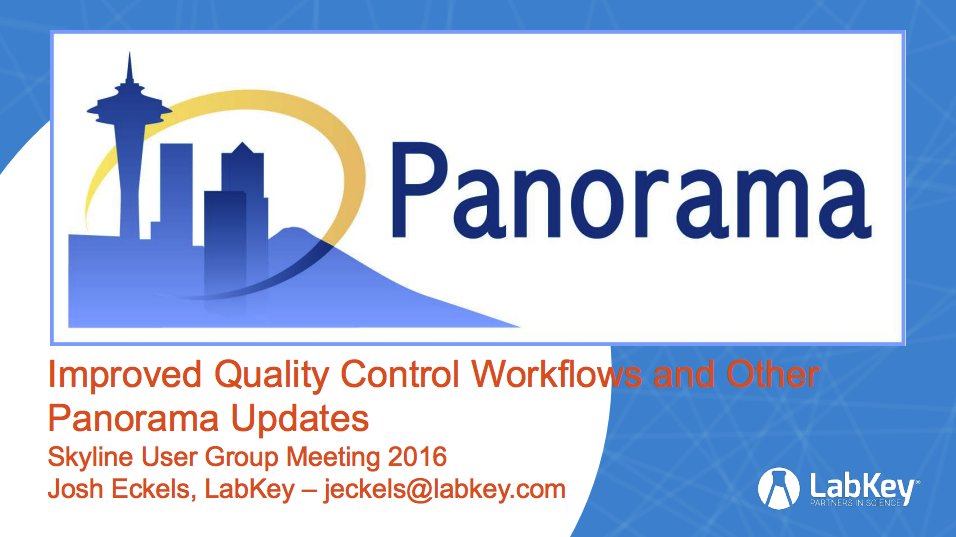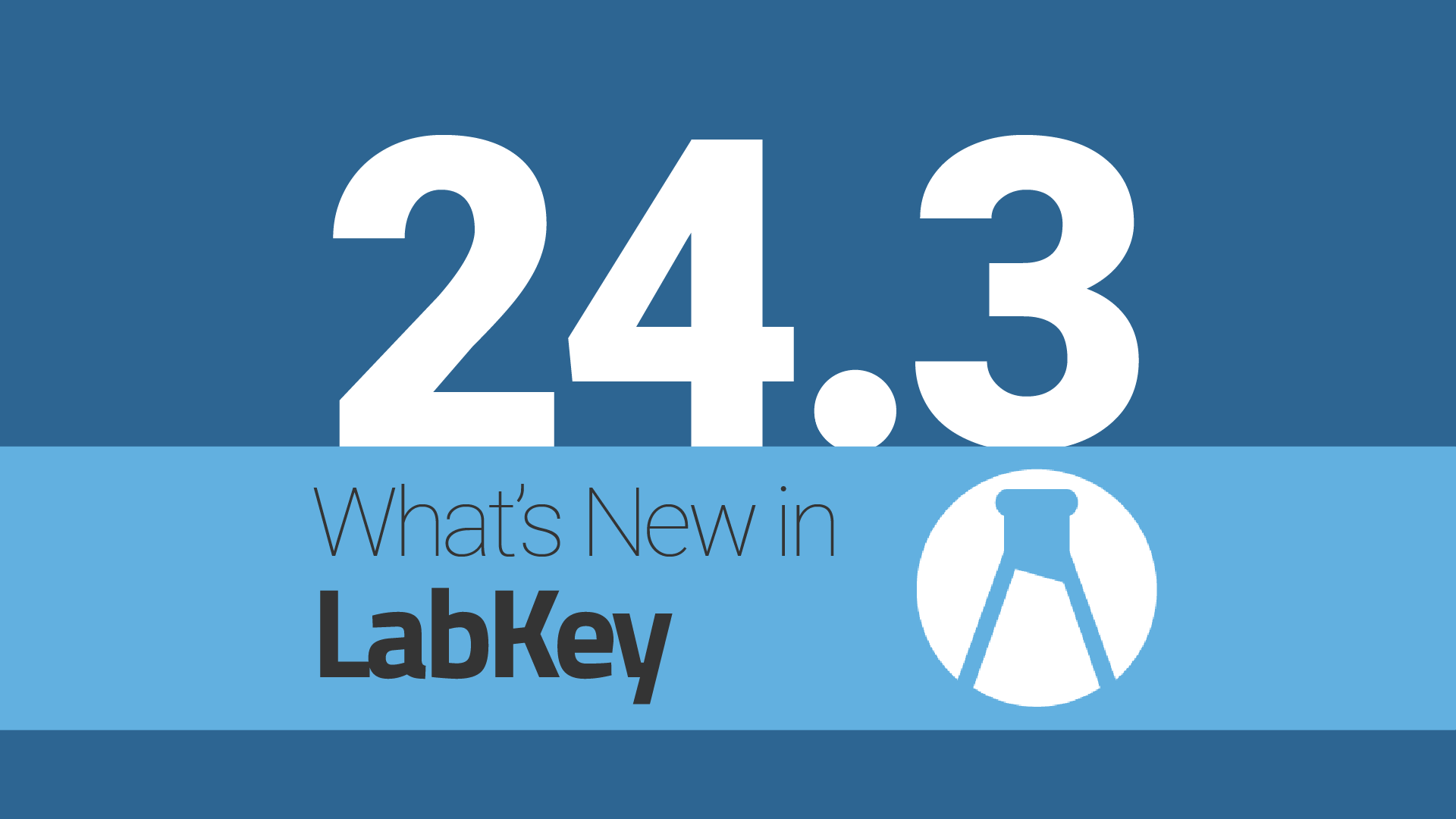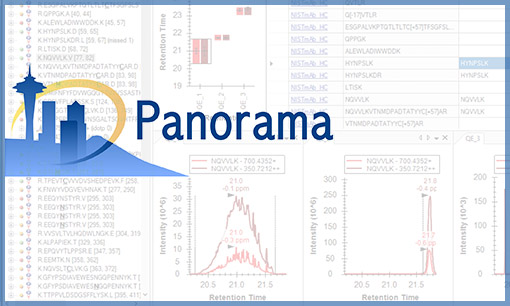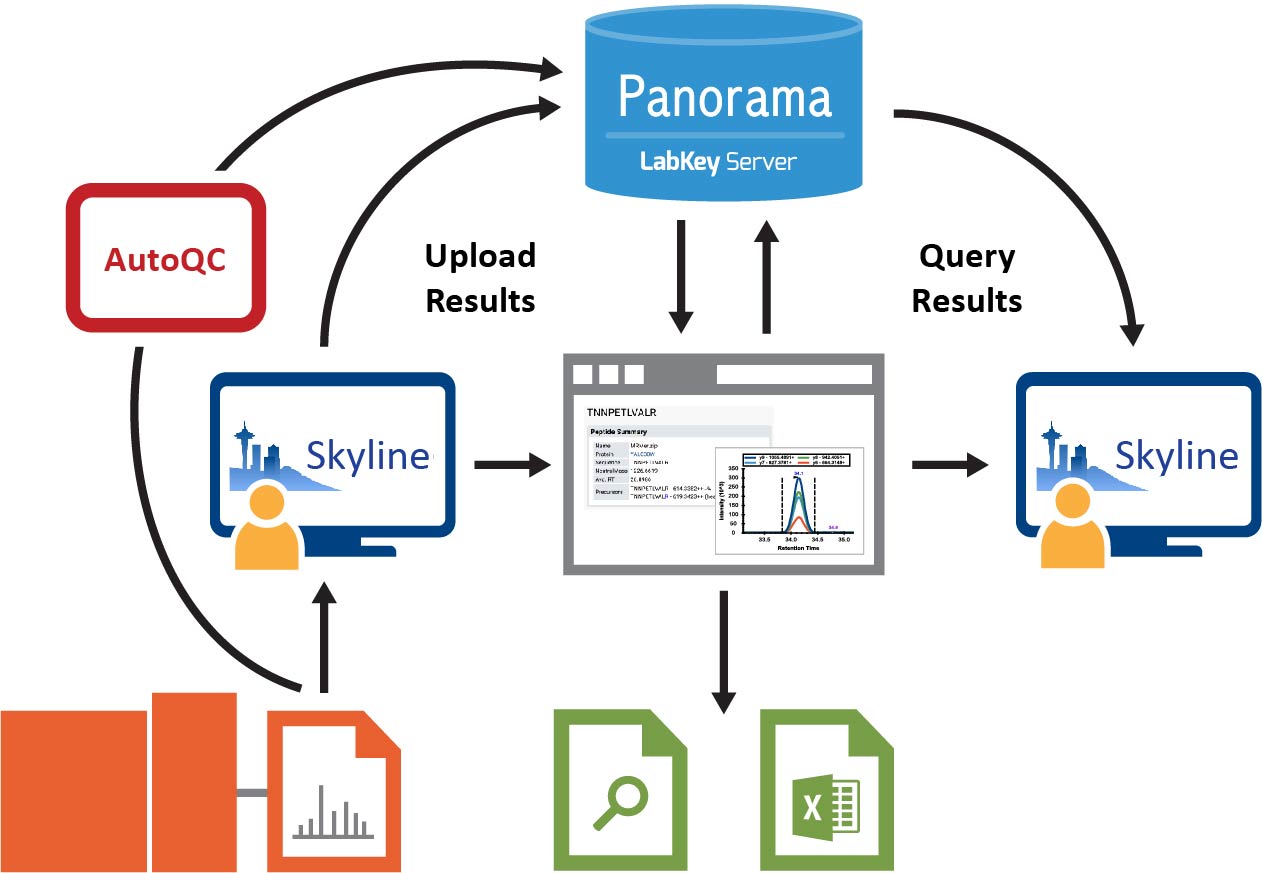Tag: Panorama
Multi-Attribute Method reporting with Panorama and Skyline
[wpi_designer_button text=’See Poster’ link=’http://www.labkey.com/wp-content/uploads/2020/11/ASMS-2020-MP-252-Panorama-MAM-reporting.pdf’ style_id=’75523′ target=’_blank’]
Panorama is a web-based data management system for targeted mass spectrometry data that integrates closely with Skyline.
The Multi-Attribute Method (MAM) is designed for improved simultaneous detection, identification, quantitation, and quality control (monitoring) of molecular attributes. Panorama has recently added MAM-specific reporting to its existing set of analytics, offering immediate results and data sharing to any imported data. Additionally, Panorama and AutoQC’s automated workflow provide longitudinal tracking of MAM-related metrics for QC purposes.
Results: Skyline lets users easily set up the proteins and peptides to analyze, and pull in raw data from all of the major mass spec vendors without needing to do a separate conversion step. Panorama organizes data into folders, and offers different folder types that are optimized for different workflows and analyses. A new MAM folder type introduces predefined reports, including a Peptide map report and a Post-translational modification report which shows the proportion for each peptide variant’s peak area across samples. More MAM-focused reporting is being added, and at any time, data can be pulled into Spotfire, Tableau, or R for additional visualization.
Conclusions: Groups first started creating MAM-related reports in Panorama via custom SQL queries in 2015, but these were not built-in as standard reports or widely distributed. As interest in MAM has grown, the Panorama team saw the need to generalize them and make them broadly available. The initial set of reports include post-translational modification percent and peptide map reports. A collaboration between users and the Skyline and Panorama development teams resulted in new capabilities to override how peptides and their variants are grouped when calculating the percentage that each variant represents of the whole. This flexible approach means that users can either use the default, which groups all PTM variants together, or group based on sequence variants or other factors. Supporting these reports directly also means that database schema changes and precalculation can speed up query times by 20x or more. Additionally, because Panorama can track a wide variety of data for automated longitudinal tracking, these MAM-related metrics can be easily incorporated into QC folders where they can be analyzed with statistical process control techniques like Levey-Jennings, CUSUM, and moving range plots. As of January 2020, more than 400 labs are using Panorama projects free of charge to manage targeted mass spectrometry assays on http://panoramaweb.org/, a server hosted by the MacCoss lab at the University of Washington. Additionally, major pharmaceutical companies and other organizations have deployed their own in-house installations of Panorama.
Panorama Partners Program
The Panorama Partners Program accelerates the adoption and integration of Panorama into member organizations’ targeted mass spectrometry workflows. Partners work directly with the Panorama and Skyline development teams, help shape the direction of ongoing development, and receive exclusive premium features.
American Society for Mass Spectrometry Conference 2019
 From June 2-6, 2019, LabKey Vice President Josh Eckels will be in Atlanta for the Annual Conference of the American Society of Mass Spectrometry. He will attend the the Skyline User Group Meeting and present a poster highlighting new quality control features for targeted mass spectrometry.
From June 2-6, 2019, LabKey Vice President Josh Eckels will be in Atlanta for the Annual Conference of the American Society of Mass Spectrometry. He will attend the the Skyline User Group Meeting and present a poster highlighting new quality control features for targeted mass spectrometry.
Meeting: Skyline User Group
Sunday, June 2
Georgia Aquarium, Atlanta
Panorama is a web-based complement to Skyline, used by more than a hundred organizations to manage, analyze, and share targeted mass spec data generated by Skyline. Since being unveiled at ASMS 2015, Panorama’s support for QC workflows has expanded significantly.
Read more in the Skyline User Group Meeting Summary >
Poster: Customizable quality control metrics and notifications with Panorama, AutoQC, and Skyline
Monday, June 3
Poster Number: 430
Introduction: Panorama’s newest quality control (QC) capabilities further extend its automated system suitability monitoring for targeted mass spectrometry assays. Panorama first added its QC folder type in 2015 in conjunction with AutoQC, a utility that monitors for newly-acquired system suitability runs targeting operator defined sets of peptide and small molecule standards. New runs are automatically analyzed using Skyline and imported into Panorama. Recent work greatly expands the metrics that can be monitored. Coupled with new types of statistical analyses and email alerts of outliers in newly acquired data, Panorama now offers an even more robust workflow.
Methods: Panorama now supports metrics that track values associated with the entire run such as statistics related to iRT regression, single replicate calibration and pressure traces, adding to its existing support for metrics associated with individual peptides and small molecules. Users can visualize their data using statistical process control plots, customize the metrics applied, subscribe to email notifications, and export in a variety of formats.
Conclusions: Panorama offers a growing collection of customizable QC metrics and has expanded beyond values associated with individual peptides and small molecules. Users can assess quality for data that is specific to their experimental design, opt-in and opt-out of the full library of metrics to eliminate false positives and focus their system suitability checks on the most diagnostic data. Panorama helps users consolidate their workflows to reduce the data processing bottlenecks that occur in many laboratories.
As of June 2019, more than 350 labs are using Panorama projects to manage targeted mass spectrometry assays and major pharmaceutical companies and other organizations have deployed their own in-house installations of Panorama.
Read more and see the full poster >
Panorama Partners Program
The Panorama Partners Program accelerates the adoption and integration of Panorama into member organizations’ targeted mass spectrometry workflows. Partners work directly with the Panorama and Skyline development teams, help shape the direction of ongoing development, and receive exclusive premium features.
Overcoming Key Challenges in Mass Spectrometry Data Management
[vc_row css=”.vc_custom_1559248243125{padding-top: 20px !important;}”]Targeted mass spectrometry methods provide reproducible and quantitative analyses for a wide range of proteins and small molecules of interest. Mass spectrometrists need tools to help manage the data they generate, analyze it, and leverage their findings when designing new assays.
There are many approaches to mass spec, including Selected Reaction Monitoring (SRM), Multiple Reaction Monitoring (MRM), Parallel Reaction Monitoring (PRM), and Data Independent Acquisition (DIA/SWATH), each of which generates varying amounts of data for analysis. The variability, scale, and reproducibility requirements of these methods require a data management solution that is flexible, robust, and secure.
LabKey Server’s solution, Panorama, integrates closely with Skyline, a leading analysis application developed by the MacCoss lab at the University of Washington. With Panorama, LabKey supports the data management needs of mass spectrometrists by:
Centralizing Storage and Querying
LabKey Server acts as a shared data repository for Skyline documents, providing:
- A shared workspace for teams to collaborate on their analyses
- Tracking of multiple document versions of the same analysis
- Easy methods for sorting, filtering, querying, and accessing results via APIs
- Retrieval of previously analyzed data for reuse in Skyline
Tracking System Suitability
LabKey Server tracks system suitability with Panorama using:
- Longitudinal tracking of key metrics including retention time, peak area, and mass accuracy
- Automated import and analysis of newly acquired samples via integration with AutoQC Loader and Skyline
- Visualizations and statistical process controls like Levey-Jennings, CUSUM (cumulative sum), and moving range plots
Supporting Published Manuscripts
Using LabKey Server, Panorama Public meets the requirements for data submission with:
- Workflows for securing data prior to publication, then sharing it after review
- Compliance with ProteomeXchange requirements for submissions, including raw files
- Stable storage for supplemental data to accompany published manuscripts
LabKey Server helps research teams efficiently manage, analyze, and publish targeted mass spectrometry data at scale, maximizing its value. To learn more about using LabKey Server to manage targeted mass spectrometry data, check out the documentation library on the LabKey Support Portal or request a demo.[vc_column width=”1/6″][vc_column width=”4/6″][vc_cta h2=”Find Us at ASMS 2019″ add_button=”bottom” btn_title=”Contact Us” btn_style=”custom” btn_custom_background=”#779e47″ btn_custom_text=”#ffffff” btn_align=”center” btn_link=”url:%2Fabout%2Fcontact%2F|||”]LabKey’s lead for Panorama, Josh Eckels, will be in Atlanta for the Annual Conference of the American Society for Mass Spectrometry. You can find him:
- At the Skyline User Group meeting on Sunday, June 2
- At his Monday, June 3 poster 430 (Customizable quality control metrics and notifications with Panorama, AutoQC, and Skyline)
- By setting up a separate time to meet by contacting LabKey
[/vc_cta][vc_column width=”1/6″]
Skyline User Group Presentation: Improved Quality Control Workflows and Other Panorama Updates
 Didn’t make it to this year’s Skyline User Group Meeting? Watch recorded sessions from the event, including Josh Eckels presentation on “Improved Quality Control Workflows and Other Panorama Updates.”
Didn’t make it to this year’s Skyline User Group Meeting? Watch recorded sessions from the event, including Josh Eckels presentation on “Improved Quality Control Workflows and Other Panorama Updates.”
[wpi_designer_button text=’Watch Presentation’ link=’https://skyline.gs.washington.edu/labkey/wiki/home/software/Skyline/events/2016%20User%20Group%20Meeting%20at%20ASMS/page.view?name=eckels#’ style_id=’75523′ target=’self’]
Presentation Overview
Panorama is a web-based complement to Skyline, used by more than a hundred organizations to manage, analyze, and share targeted mass spec data generated by Skyline. Since being unveiled at ASMS 2015, Panorama’s support for QC workflows has expanded significantly. With input from the SProCoP team and the user community, new and improved metrics, automation, and visualizations build on the previous functionality. Additionally, Skyline and Panorama now include document version tracking for method building and other workflows, and Panorama now supports small molecule data. This presentation will demonstrate the new capabilities and outline plans for Panorama’s ongoing development.
About Josh
Josh Eckels has lead development on proteomics related projects for LabKey Server over the past 10+ years, and he currently oversees Panorama development. He is experienced in security-related projects, client-side end user applications, and server-side development. Prior to joining LabKey, Josh worked most recently on Amazon.com’s data warehouse, developing the software that schedules and executes loading and querying of more than 30 terabytes of data. Before that, he was the team lead for the debugger for BEA System’s WebLogic Workshop. At LabKey, he focuses on mass spectrometry, other assay types, experimental annotations and general infrastructure. Josh has a BS in Computer Engineering from Northwestern University.


